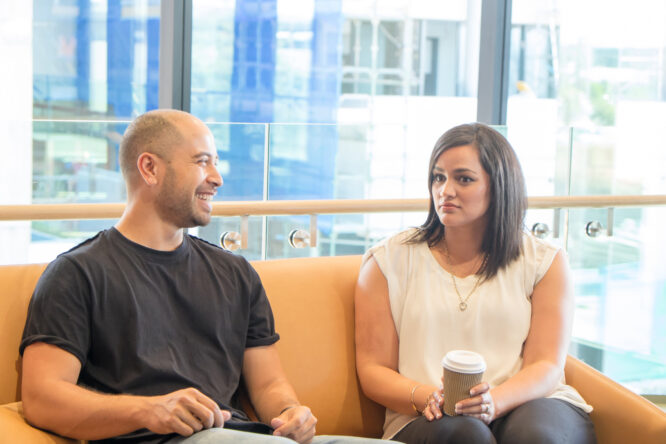You don’t need to be the loudest, funniest, or most outgoing person in the room to hold your own in a conversation.

Even if you’re shy, introverted, or just not great with socialising, you can still come across as intelligent, insightful, and incredibly engaging—and isn’t that what we all want? With the right mindset and a few subtle changes, you can stop overthinking and start speaking with more ease (and a lot less dread). Here are some things to try that will really help.
1. Stop aiming for “interesting”—aim for present.

Trying to sound impressive often backfires. You end up rehearsing your next sentence instead of actually listening, and that’s when things start feeling awkward. The people who seem naturally confident in conversation? They’re usually just present. They focus on what’s being said, not how they look. The more grounded you are in the moment, the less awkwardness sticks.
2. Ask questions that go beyond the surface.

“How’s work?” is fine, but “What’s been the best part of your week?” gets a much more real answer. If you want the convo to flow, ask questions that invite a little story, not just a yes or no. This takes the pressure off you and gives the other person something to run with. Plus, people tend to enjoy talking about themselves—it helps you both feel more relaxed without forcing small talk.
3. Let go of needing the perfect reply.

One major cause of awkwardness? Obsessing over what to say next. You don’t need the perfect comeback, joke, or insight. Just responding naturally is enough. Sometimes a simple “That’s so true,” or “Wow, I hadn’t thought of it like that,” keeps things flowing better than anything clever. Conversations aren’t auditions—you’re allowed to just be real.
4. Talk slower than you think you should.

When you’re nervous, your speech tends to speed up. You try to get your point out before your anxiety catches up, but that often makes you sound more flustered. Slowing down, even just slightly, gives off an air of calmness and confidence. It gives you time to think, and it gives the other person space to digest what you’re saying.
5. Embrace the natural pauses that will inevitably crop up.

Silence feels awkward only if you treat it like something to escape. In reality, short pauses are normal, even in good conversations. Let them happen. Take a breath, sip your drink, smile. Pauses give people a moment to reflect and reset. Owning the quiet shows you’re not panicking, and that’s magnetic in itself.
6. Stop replaying every sentence in your head.

Post-convo overthinking is real. You second-guess a joke, worry you talked too much, or assume someone secretly hated your vibe. Most of the time, they didn’t even notice. Train yourself to let it go. Ask: “Would I be judging someone else for saying that?” Probably not. Conversations are messy and human. That’s the point.
7. Show interest with your face, not just your words.

Good conversation isn’t just about what you say—it’s about how present you seem. Eye contact, a soft smile, and a little nod go further than filler phrases ever will. When your face shows you’re listening, people relax. Weirdly, that makes you feel more confident, too. It pulls you into the rhythm of the moment instead of your own head.
8. Mirror their energy, but stay true to yours.

Matching someone’s vibe helps build rapport. If they’re chill and low-key, you don’t need to suddenly crank up the volume. If they’re bubbly, you can lean in without faking a personality switch. It’s less about becoming a chameleon and more about finding the overlap between how they express themselves and what feels natural for you. That sweet spot is where conversation starts to click.
9. Use openers that give the other person space.

Instead of saying “Tell me about your job” (which feels like a pop quiz), try “How did you get into what you do?” It’s more casual, more open-ended, and lets the other person steer a little. This takes pressure off both of you. You’re not drilling for info—you’re just being curious. Curiosity is the smoothest way into connection.
10. Laugh at the awkward moments when they happen.
 Source: Unsplash
Source: Unsplash Let’s be real: you will occasionally stumble, say something weird, or hit a conversational dead end. The trick is not pretending it didn’t happen—it’s rolling with it. A self-aware laugh, or something along the lines of, “Well, that sentence got away from me” shows you’re comfortable being imperfect. That honesty is way more charming than flawless delivery.
11. Practise “back pocket” topics for more awkward moments.

It’s helpful to have a few go-to conversation starters in your back pocket—things you can casually throw in when the vibe dips. Ask about food, travel plans, local spots, or cultural moments (“Have you watched ___ yet?”). You’re not memorising scripts—it’s just handy to have a few familiar trails you can wander down if the energy stalls. Everyone does it, even people who seem super natural in conversation.
12. Don’t over-focus on your awkwardness—it makes it more obvious.
 Source: Unsplash
Source: Unsplash When you’re hyper-aware of your awkwardness, it becomes the centre of the show (at least in your mind). However, most people are too focused on their social jitters to notice yours. Try to focus your attention outward—onto the conversation, the topic, the other person’s body language. That small mental adjustment is often enough to reduce the pressure and help you feel more at ease.
13. Share something small and personal.
 Source: Unsplash
Source: Unsplash Letting people see a little bit of who you are creates connection. It doesn’t have to be deep—a quick anecdote, a “this always happens to me,” or a random opinion on something light all invite natural back-and-forth. It breaks the surface tension, and when you’re open (even just a little), it makes the conversation feel less like small talk and more like real talk.
14. Remind yourself: connection > performance.
 Source: Unsplash
Source: Unsplash You’re not being interviewed. You’re not on stage. The goal of conversation isn’t to impress—it’s to connect. When you stop trying to perform, you give yourself permission to just be, and people feel that. That grounded energy is what makes someone easy to talk to. Not their vocabulary, not their stories—just their willingness to show up as themselves.




